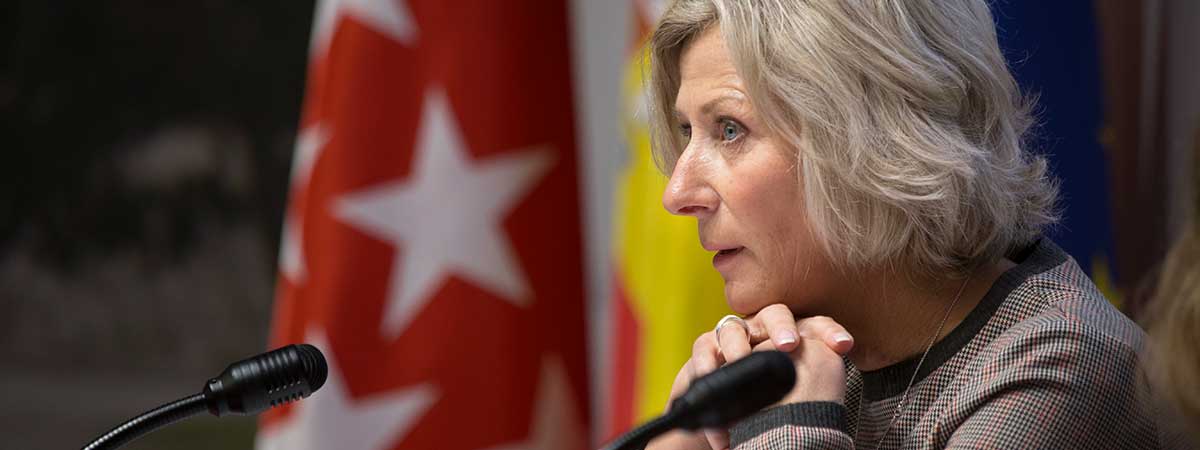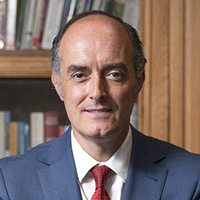Master's Degree in European Law and Policy*
*Degree pending verification by accrediting body

Program that analyzes the EU from the historical, political, economic and legal points of view
The main characteristic of the Master's Degree in European Law and Policy is training in the various matters in which the European Union is involved, mainly focused on its political, legal, institutional, economic, social, educational and cultural aspects.
It is, therefore, an interdisciplinary Master's degree, since it includes a wide selection of subjects taught by prestigious personalities, including a select participation of expert professors of Law, Economics and Social Sciences, along with Jean Monnet Full Professors, and has the collaboration of personalities who have held relevant positions in the European Institutions, Parliament, Commission and Court of Justice, Economic and Social Committee, Committee of the Regions, Court of Auditors and European Central Bank.
Student profile: Interest in European issues; historical culture on the European construction; curiosity for learning about the application of public policies of the European Union; interest in developing a working or research career in European issues, inquisitiveness for EU law; versed in current affairs and European issues.
Others: Graduates of History, Politics, Law, International Relations, Sociology, Journalism, Humanities... This master's degree can also be accessed from scientific-technical careers, provided that some additional training is completed at the beginning of the master's degree.
Official Degree:Master's Degree in European Law and Policy
Center responsible:School of Law and International Relations
Branch of knowledge: Social and Legal Sciences
Places offered: 30 the first year and 50 the following years
Total Créditos 60 credits.
Minimum of 12 ECTS credits and maximum of 60 ECTS credits per enrollment and academic period
Academic year in which it was implemented: 2023
Duration: 1 year
Type of education: Blended
Academic Regulations: General student’s regulations. Credit transfer and recognition. Regulation of student participation. Common procedures for carrying out the Final Research Project
University Services: [+info]
Internal Quality Assurance System System managers Incidents, Suggestions and Complaints Job placement report and assessment of training received
Make the most of this Master's degree to study the European Union in depth
Curriculum
The student must take 60 credits
First Semester 28 ECTS
- 7 ECTS | EU History and Institutions
- 7 ECTS | EU Law (I)
- 7 ECTS | EU Law (II)
- 7 ECTS | The external action of the European Union
Second Semester 32 ECTS
From January to June, both included- 7 ECTS | The internal policies and actions of the European Union
- 7 ECTS | The economic governance of the European Union
- 6 ECTS | Professional Internship
- 12 ECTS | Master's final research project
More Academic Information
Competences
Knowledge or content- K1. Describe the historical evolution of the European Union, its law and public policies.
- K2. State the legal foundations of the European Union.
- K3. Identify the characteristics of integration processes and their importance in a world in the midst of a globalization process.
- K4. Show the necessary tools to apply the public policies of the Union and the execution of its right by the Member States.
- K5. Name the Institutions of the European Union and their functionality.
- K6. Define the responsibilities of the different institutional actors of the European Union.
- K8. Distinguish the role of European leaders and member countries that have contributed to integration.
- K7. Analyze the importance of the foreign action of the European Union and its public diplomacy.
- K9. Distinguish the specification process of a European legal standard.
- K10. Identify a European legal act and know how to classify it.
- K11. Resolve an appeal before the Court of Justice of the European Union.
- K12. Appreciate the relevance of the normative transposition of European law to the Member State.
- K13. Summarize the correct implementation of European law.
- K14. Complete requests for funds and European plans.
- K15. Explain the reform processes of European law.
- K16. Create European cohesion or development aid programs.
- K17. Evaluate the recommendations made by the European institutions to the Member State.
- S1. Evaluate scientific texts related to EU law.
- S2. Present the characteristics of EU law, its principles and scope.
- S3. Describe the role of the different institutions, agencies and bodies of the European Union.
- S4. Recognize the role of the founding fathers of the European Union in the construction of legal integration.
- S5. Discover the needs of the Member States in the negotiation of European regulations.
- S6. Organize negotiation strategies for European standards in the different institutions of the Union.
- S7. Adequately show the annual work program of the European Commission and its preparation of regulatory proposals.
- S8. Illustrate the correct application of European regulations.
- S9. Investigate the documentation that the European institutions need to comply with the funds allocation plans.
- S10. Correctly combine the technical vocabulary related to the law of the European Union.
- S11. Outline a European legal act and its possible transposition.
- S12. Compare and put into practice the public policies of the European Union.
- S13. Examine the advantages of integration processes over cooperation processes.
- S14. Using the appropriate vocabulary, argue EU law in any type of context and in all sectors of activity.
- S15. Collaborate in the promotion programs of the European Union and assume an active role in the public diplomacy of the work of the European institutions in the elaboration of the law of the European Union.
- First: The projection of the University committed to European spaces.
- Second: The institutions, companies and citizens are looking for experts who can explain and detail how the European Union works.
The Antonio de Nebrija University wants to contribute in this space to train solid professionals aware of their role in European integration, through the study of a focused selection of subjects in the field of European research, taught by leading experts. - Tercera: Third: In the current curricula of the branch of Social and Legal Sciences, there is not enough curricular training on European Union law, specifically with subjects that contemplate a detailed and in-depth study of its legal system, the construction of the process integrator and its varied jurisprudence.
Generally, the curricula of the different university degrees include subjects that range between 4 and 6 credits, but they do not serve to grant the deepest legal notions, so that future graduates are fully aware of the importance of EU law. This is achieved in the best of cases when students have taken optional subjects in relation to other more unique aspects of the regulatory activity of the European Union, such as foreign action, the functioning of the Economic and Monetary Union, the Internal Market and the History of Integration.
These references can be generalized to the matter at hand, specifically to the major policies of the European Union, such as the Internal Market, Agriculture, Industry, Transport, Education, Health, Environment, Energy, etc., which are policies in which there is already a historical and legal legacy, but that are continually in the process of improvement, and of new political and legal positions of economic, social and human significance. - Fourth: The internationalization of professional activities is an irreversible phenomenon that is intrinsically linked to the globalization that the world is experiencing. In this sense, preparation must be in line with the needs of this historic moment, which calls for greater attention to European affairs.
- Fifth: The international political, social and multicultural context that Spain and Europe are experiencing demands that the work carried out from the European Union and from the integration processes be taught for the global community, that is, for students belonging to other continents, not only the European one. The attraction of international talent has a double purpose, on the one hand, to show the intangible asset that European culture has, and to forge the next generations of leaders with a strong European spirit, in line with the Spanish contribution to the European integration process.
It is recognized that the European Union is the most advanced in the experiences of integration processes in the world. As the Treaties were reformed, from 1957 to the present, the Community, and then the European Union, have received a greater number of powers and, consequently, occupies an increasingly relevant space in the political, economic, and social life of the States that form it, building a legal, political and economic system of international recognition, a fact that mobilizes educational interest and public attention.
In consideration of the importance that the European Union has in the global world, Nebrija University wants to consolidate this Master's degree for several reasons:
Consequently, the Master's Degree in EU Law and Policy of the Antonio de Nebrija University allows students to acquire through face-to-face and distance learning classes theoretical and practical exercises, a coordinated set of solid legal, economic, historical, political and international knowledge, required by the current professional environment of the global market; it is highly specialized and diversified, and not only as a scientific and academic alternative, but for their own education as European citizens, and the possibility of integrating more actively in the various scenarios in which one can act in their professional and life path.
Based on the various arguments, the methodology of the curriculum of the Master's degree in EU Law and Policy combines high theoretical content with special emphasis placed on the search for documentation, jurisprudence, White and Green Papers, papers on community law, various contributions of doctrinal development, press releases, etc. Likewise, practice in daily negotiation on European issues.
In this sense, it is a matter of giving a basic configuration, a solid theoretical as well as practical pillar, so that the subsequent processing of all the information and the training of competences orbit around it in order to train true professional experts in the field of European Union.
Blended Study
Admission
Admission Requirements
Admission to the Antonio de Nebrija University will depend on the places offered and available in the degree, and on compliance with the legal requirements for accessing the University contemplated by current legislation.
Students enrolling for the first time at the Antonio de Nebrija University follow the procedure established by the University described below.:
Once the admission application has been submitted with the documentation required by each case, and verified by the admissions department, the students are summoned to take the admission test. They must come with D.N.I. or passport to prove their identity.
In the specific case of the Master's Degree in European Law and Policy, the entrance tests will consist of a personal interview, in Spanish, and assessment of the academic record. These two are a guideline. They will serve to evaluate the elements related to the academic and professional success of the student who wishes to enroll, in addition to their specific training needs and motivations to carry out the Master's degree.
The Director of the Master's degree will be in charge of carrying out the assessment of the academic record and the personal interview.
For the purposes of pre-admission and admission, the evaluation of the candidate will be made on a scale from 0 to 10 points, taking into account the following criteria and percentages:
- Academic record [60%] . The grades obtained by the candidate in their previous studies will be assessed.
- Structured personal interview [30%]. The suitability of the candidate will be assessed in view of their experience, knowledge, technical and professional skills required to successfully take the studies they intend to carry out. Their motivation and attitudes will also be assessed, as well as other personal aspects that contribute to their adequate adjustment to the chosen studies. The interview may be conducted in the language in which the studies are taught.
- Presentation document of the candidate [10%]. In a document prepared personally, candidates will explain their motivation and interest in the requested studies, as well as any other personal circumstance that they considers relevant to the selection process.
In the event that the candidate's mother tongue is not Spanish, they must prove they have a B2 level of Spanish, through any accredited certificate.
Admission tests must be assessed within a global strategy aimed at knowing the characteristics of the applicants, in order to determine if the candidate has sufficient motivation, as well as training and knowledge, skills, aptitudes, communication skills, extracurricular activities and future interests necessary to be admitted as a candidate in Nebrija University's programs.
The Admissions Committee, made up of the Department of University Development and the Department of Law, will meet as needed and communicate the result of the admission to the candidate by email, telephone and letter so that they can proceed with the enrollment.
If the number of applicants exceeds the number of places offered, the student's academic record (grade average) will be taken as admission criteria.
Therefore, all those interested in accessing the studies of the Master's Degree in European Law and Policy must present, without exception, their academic record, since the grade average will decide their admission to the Master's, if the number of applications exceeds the number of places offered.
Once the places are filled, if there are more people interested in being admitted, they will remain on the waiting list for possible vacancies that may arise before the start of the academic year, and the detailed admission and selection criteria applied for the rest of the candidates will be applied to them as well.
Pre-enrollment
Once admission has been communicated, candidates must reserve their place. This economic pre-enrollment guarantees the candidate's place at the University.
Enrollment
Pre-enrolled candidates who wish to formalize their academic enrollment at the University must, within the indicated deadlines, follow these steps:
- 1. Submit documentation: documentary proof that they have passed the requirements established by Spanish university legislation in order to begin/continue their university studies at Nebrija University.
- 2. Formalize the enrollment process online: The self-enrollment service on the Nebrija website allows admitted students to carry out all the academic, economic and administrative procedures, without having to physically go to the University. Admitted students will formalize their self-enrollment within indicated deadlines. To do this, they will receive at their address, together with their admission letter, the access code and personal password necessary to carry out their academic and economic self-enrollment. Once the self-enrollment is formalized, and after verification of the documentation submitted, the candidate acquires the status of a student of Nebrija University. In the self-enrollment process, the student will have at all times the technical assistance of the Computer Services department, as well as academic assistance through the person who will be their Tutor, so that he/she can guide them in choosing subjects.
- 3. Payment of the annual registration fees for the degree for which they were admitted. The place reservation is a part of the annual registration fee.
- 4. Real possibility of correctly taking the studies provided for in the requested degree (which may have a certain face-to-face component). This will be assessed during the personal interview, in which the interviewer, in addition to all the access and admission criteria already mentioned for the face-to-face modality, will assess whether the job and personal situation of the candidate, their availability, etc., is compatible with the normal development of the teaching-learning process and activities with the expected study load. As a result of this joint analysis, which will entail a mutual exchange of information, students can be guided about their real possibilities, the recommended annual tuition fee, the compulsory attendance in some activities or, even, where appropriate, reject their candidacy, if a probable impossibility of satisfactorily carrying out the programmed training activities is detected.
Employability
Career Opportunities
Collaboration Agreements for professional practices
This Master maintains collaboration agreements for professional practices with some of the best companies and institutions in the sector, among which the following stand out:
More Information of Internships in CompaniesTestimonials
University Life in European Law and Policy
Visit all the Activities of the School of Law and International Relations
Conference: "Law in the time of Nebrija"
The conference "Law in the time of Nebrija" was organized by the Antonio de Nebrija Foundation, together with the School of Law and International Relations. Pérez-Bustamante's master class is part of the acts commemorating the 5th Centenary of the death of Antonio de Nebrija.
Nebrija Grand Gala
The events of the 5th Centenary of the death of Antonio Nebrija officially started with the celebration of a grand gala at the Royal Theater. Chaired by Their Majesties the King and Queen of Spain, the event revolved around the figure of Antonio de Nebrija, who introduced humanism in Spain and was the author of the first Castilian grammar.
Opening ceremony of the academic year
Opening ceremony of the academic year on the Madrid-Princesa campus of Nebrija University.
Graduation Ceremonies | POSTGRADUATE
Graduation Ceremony for Nebrija University Graduate Studies at the Life Sciences Campus in La Berzosa.









